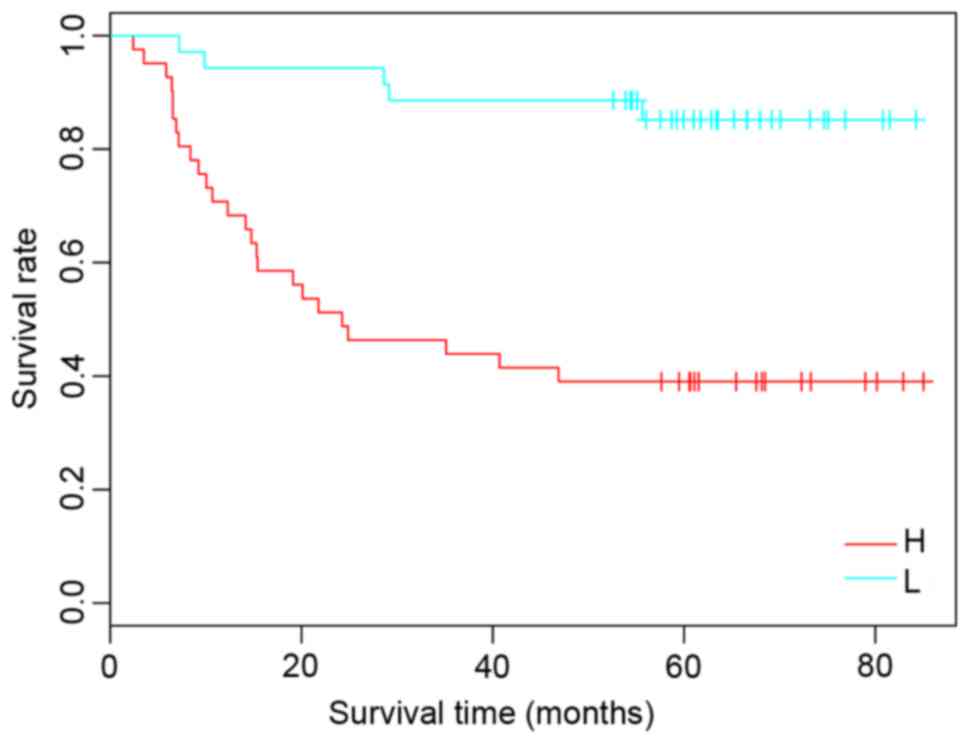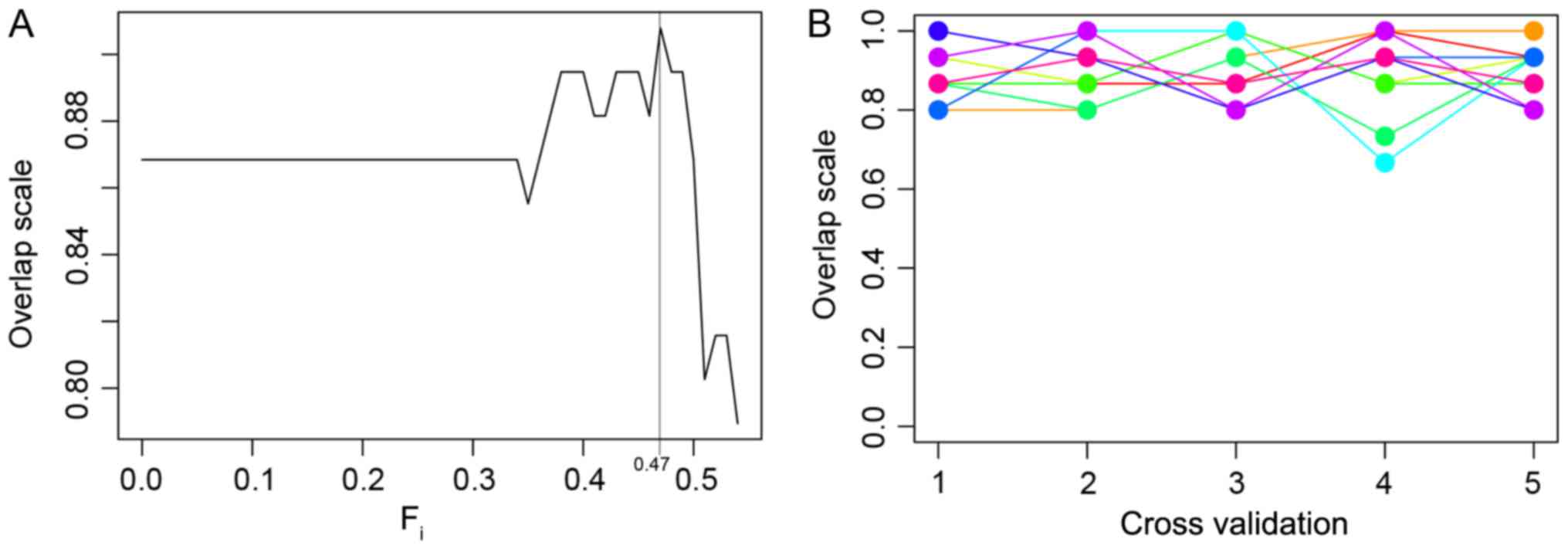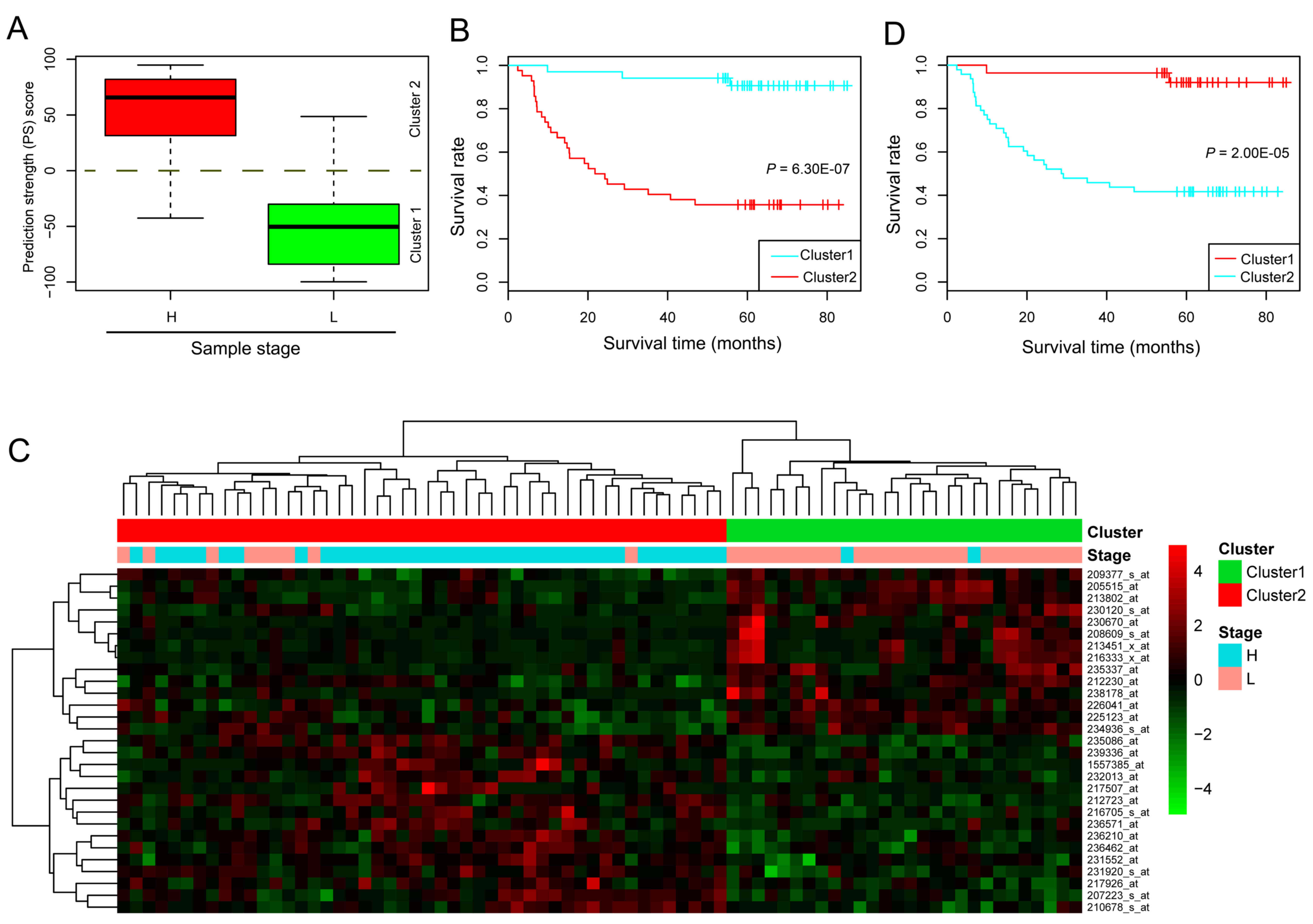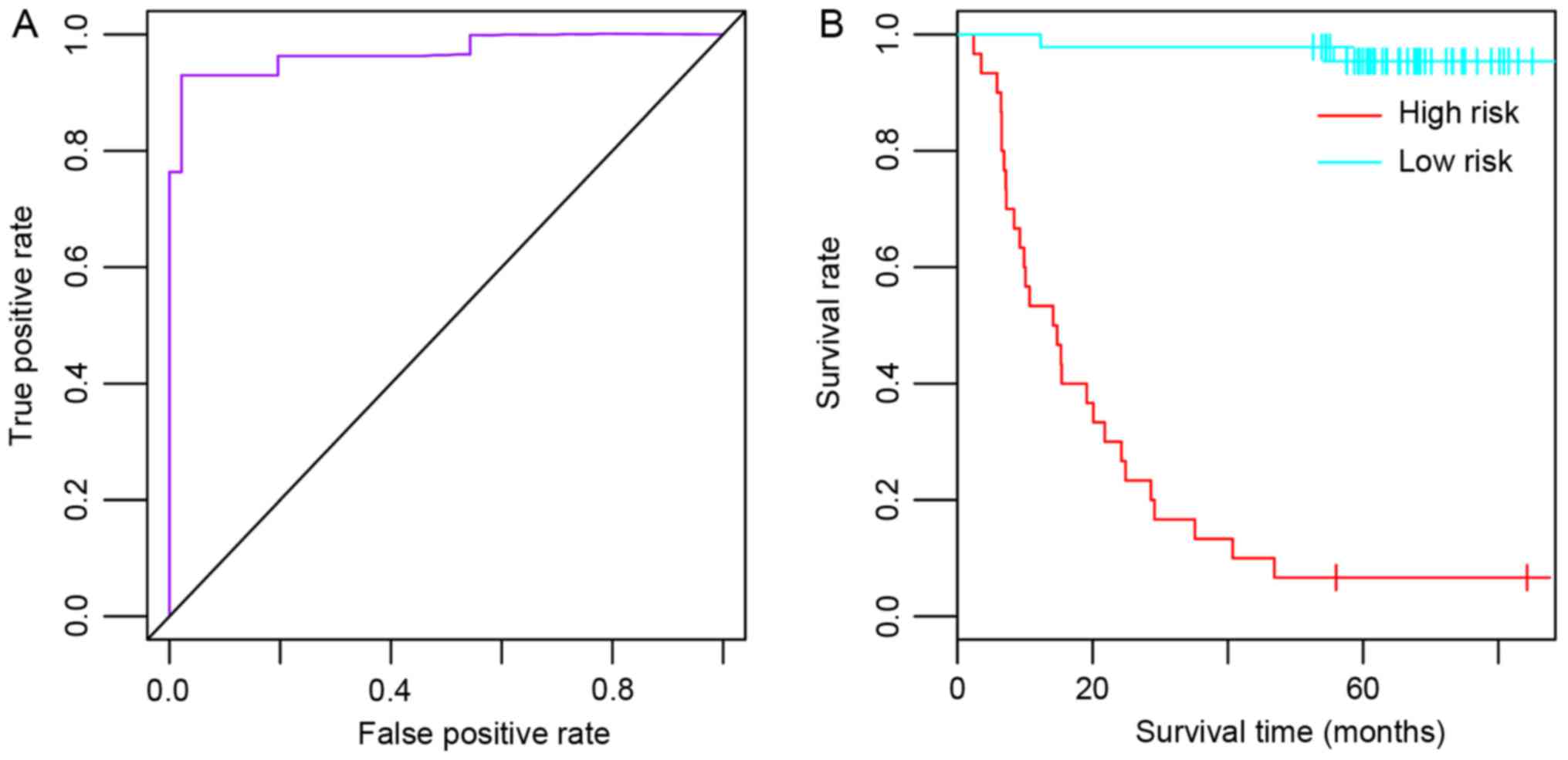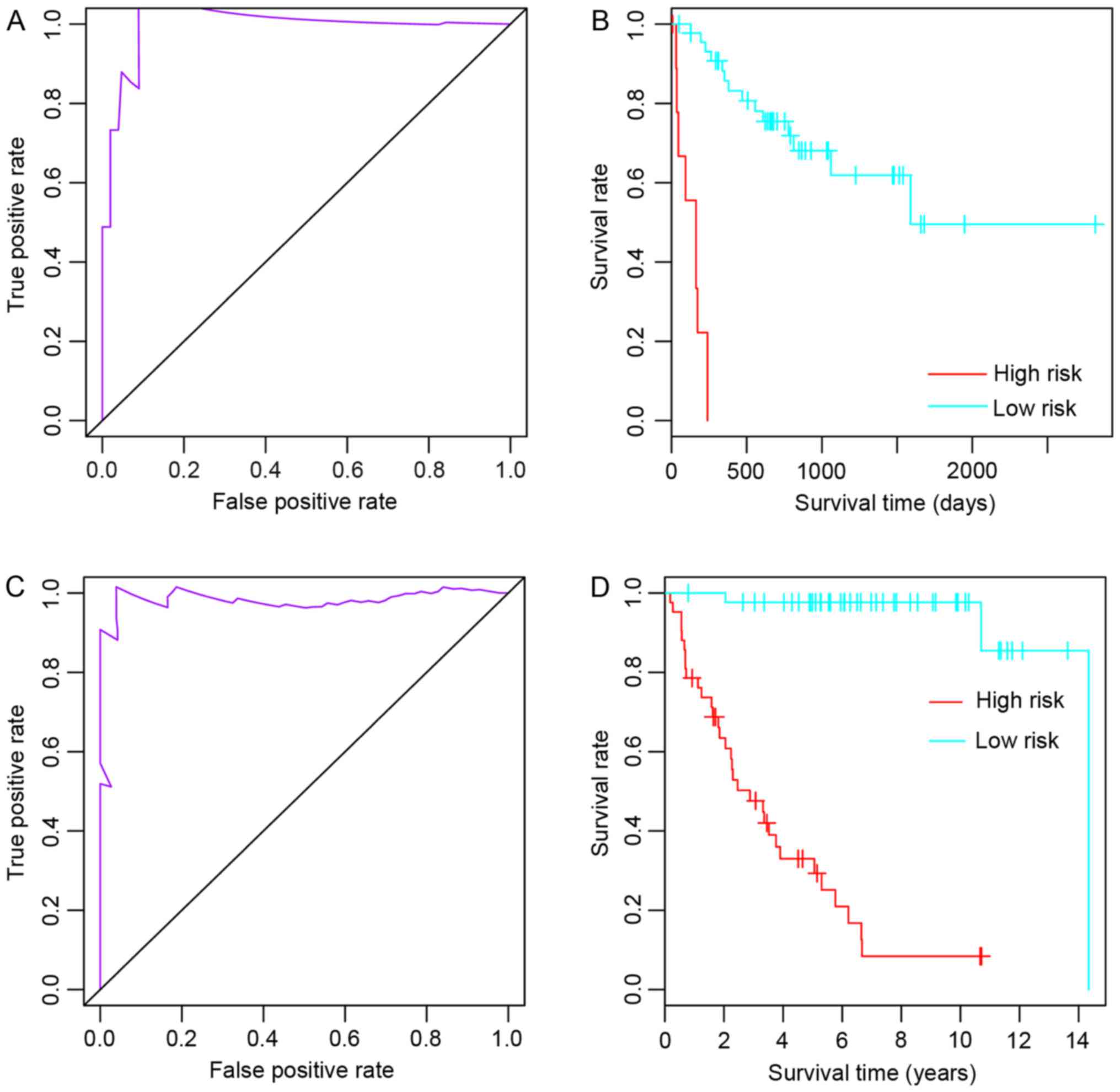|
1
|
Chin D, Boyle GM, Porceddu S, Theile DR,
Parsons PG and Coman WB: Head and neck cancer: Past, present and
future. Expert Rev Anticancer Ther. 6:1111–1118. 2006. View Article : Google Scholar : PubMed/NCBI
|
|
2
|
Wyss AB, Hashibe M, Lee YA, Chuang SC,
Muscat J, Chen C, Schwartz SM, Smith E, Zhang ZF, Morgenstern H, et
al: Smokeless Tobacco Use and the Risk of Head and Neck Cancer:
Pooled Analysis of US Studies in the INHANCE Consortium. Am J
Epidemiol. Oct 15–2016.(Epub ahead of print). View Article : Google Scholar : PubMed/NCBI
|
|
3
|
Cannonier SA, Gonzales CB, Ely K, Guelcher
SA and Sterling JA: Hedgehog and TGFβ signaling converge on Gli2 to
control bony invasion and bone destruction in oral squamous cell
carcinoma. Oncotarget. 7:76062–76075. 2016.PubMed/NCBI
|
|
4
|
Yakob M, Fuentes L, Wang MB, Abemayor E
and Wong DTW: Salivary biomarkers for detection of oral squamous
cell carcinoma-current state and recent advances. Curr Oral Health
Rep. 1:133–141. 2014. View Article : Google Scholar : PubMed/NCBI
|
|
5
|
Zini A, Czerninski R and Sgan-Cohen HD:
Oral cancer over four decades: Epidemiology, trends, histology, and
survival by anatomical sites. J Oral Pathol Med. 39:299–305. 2010.
View Article : Google Scholar : PubMed/NCBI
|
|
6
|
Wu JY, Yi C, Chung HR, Wang DJ, Chang WC,
Lee SY, Lin CT, Yang YC and Yang WC: Potential biomarkers in saliva
for oral squamous cell carcinoma. Oral Oncol. 46:226–231. 2010.
View Article : Google Scholar : PubMed/NCBI
|
|
7
|
Belbin TJ, Singh BI, Socci N, Wenig B,
Smith R, Prystowsky MB and Childs G: Molecular classification of
head and neck squamous cell carcinoma using cDNA microarrays.
Cancer Res. 62:1184–1190. 2002.PubMed/NCBI
|
|
8
|
Chung CH, Parker JS, Karaca G, Wu J,
Funkhouser WK, Moore D, Butterfoss D, Xiang D, Zanation A, Yin X,
et al: Molecular classification of head and neck squamous cell
carcinomas using patterns of gene expression. Cancer Cell.
5:489–500. 2004. View Article : Google Scholar : PubMed/NCBI
|
|
9
|
Lohavanichbutr P, Houck J, Fan W, Yueh B,
Mendez E, Futran N, Doody DR, Upton MP, Farwell DG, Schwartz SM, et
al: Genome-wide gene expression profiles of HPV-positive and
HPV-negative oropharyngeal cancer: Potential implications for
treatment choices. Arch Otolaryngol Head Neck Surg. 135:180–188.
2009. View Article : Google Scholar : PubMed/NCBI
|
|
10
|
Fakhry C, Westra WH, Li S, Cmelak A, Ridge
JA, Pinto H, Forastiere A and Gillison ML: Improved survival of
patients with human papillomavirus-positive head and neck squamous
cell carcinoma in a prospective clinical trial. J Natl Cancer Inst.
100:261–269. 2008. View Article : Google Scholar : PubMed/NCBI
|
|
11
|
Al-Malkey MK, Abbas AAH and Yaseen NY:
Human papilloma virus types 16 and 18 in a sample of iraqis
patients presented with oral cancer. Iraqi J Med Sci. 14:174–181.
2016.
|
|
12
|
Lohavanichbutr P, Méndez E, Holsinger FC,
Rue TC, Zhang Y, Houck J, Upton MP, Futran N, Schwartz SM, Wang P
and Chen C: A 13-gene signature prognostic of HPV-negative OSCC:
Discovery and external validation. Clin Cancer Res. 19:1197–1203.
2013. View Article : Google Scholar : PubMed/NCBI
|
|
13
|
Saintigny P, Zhang L, Fan YH, El-naggar
AK, Papadimitrakopoulou VA, Feng L, Lee JJ, Kim ES, Ki Hong W and
Mao L: Gene expression profiling predicts the development of oral
cancer. Cancer Prev Res (Phila). 4:218–229. 2011. View Article : Google Scholar : PubMed/NCBI
|
|
14
|
O'Quigley J and Moreau T: Cox's regression
model: Computing a goodness of fit statistic. Comput Methods
Programs Biomed. 22:253–256. 1986. View Article : Google Scholar : PubMed/NCBI
|
|
15
|
Golub TR, Slonim DK, Tamayo P, Huard C,
Gaasenbeek M, Mesirov JP, Coller H, Loh ML, Downing JR, Caligiuri
MA, et al: Molecular classification of cancer: Class discovery and
class prediction by gene expression monitoring. Science.
286:531–537. 1999. View Article : Google Scholar : PubMed/NCBI
|
|
16
|
Fay MP and Shaw PA: Exact and asymptotic
weighted logrank tests for interval censored data: The interval R
package. J Stat Softw. 36:pii: i022010. View Article : Google Scholar
|
|
17
|
Lacny S, Wilson T, Clement F, Roberts DJ,
Faris PD, Ghali WA and Marshall DA: Kaplan-Meier survival analysis
overestimates the risk of revision arthroplasty: A meta-analysis.
Clin Orthop Relat Res. 473:3431–3442. 2015. View Article : Google Scholar : PubMed/NCBI
|
|
18
|
Dennis G Jr, Sherman BT, Hosack DA, Yang
J, Gao W, Lane HC and Lempicki RA: DAVID: Database for annotation,
visualization, and integrated discovery. Genome Biol. 4:P32003.
View Article : Google Scholar : PubMed/NCBI
|
|
19
|
Heagerty PJ, Thomas L and Pepe MS:
Time-dependent ROC curves for censored survival data and a
diagnostic marker. Biometrics. 56:337–344. 2000. View Article : Google Scholar : PubMed/NCBI
|
|
20
|
Bolstad BM, Irizarry RA, Astrand M and
Speed TP: A comparison of normalization methods for high density
oligonucleotide array data based on variance and bias.
Bioinformatics. 19:185–193. 2003. View Article : Google Scholar : PubMed/NCBI
|
|
21
|
Irizarry RA, Hobbs B, Collin F,
Beazer-Barclay YD, Antonellis KJ, Scherf U and Speed TP:
Exploration, normalization, and summaries of high density
oligonucleotide array probe level data. Biostatistics. 4:249–264.
2003. View Article : Google Scholar : PubMed/NCBI
|
|
22
|
Kitson AP, Stark KD and Duncan RE: Enzymes
in brain phospholipid docosahexaenoic acid accretion: A PL-ethora
of potential PL-ayers. Prostaglandins Leukot Essent Fatty Acids.
87:1–10. 2012. View Article : Google Scholar : PubMed/NCBI
|
|
23
|
Boutet E, El Mourabit H, Prot M, Nemani M,
Khallouf E, Colard O, Maurice M, Durand-Schneider AM, Chrétien Y,
Grès S, et al: Seipin deficiency alters fatty acid Delta9
desaturation and lipid droplet formation in Berardinelli-Seip
congenital lipodystrophy. Biochimie. 91:796–803. 2009. View Article : Google Scholar : PubMed/NCBI
|
|
24
|
Subauste AR, Das AK, Li X, Elliott BG,
Evans C, El Azzouny M, Treutelaar M, Oral E, Leff T and Burant CF:
Alterations in lipid signaling underlie lipodystrophy secondary to
AGPAT2 mutations. Diabetes. 61:2922–2931. 2012. View Article : Google Scholar : PubMed/NCBI
|
|
25
|
Talukder MM, Sim MF, O'Rahilly S,
Edwardson JM and Rochford JJ: Seipin oligomers can interact
directly with AGPAT2 and lipin 1, physically scaffolding critical
regulators of adipogenesis. Mol Metab. 4:199–209. 2015. View Article : Google Scholar : PubMed/NCBI
|
|
26
|
Smyth SS, Mueller P, Yang F, Brandon JA
and Morris AJ: Arguing the case for the autotaxin-lysophosphatidic
acid-lipid phosphate phosphatase 3-signaling nexus in the
development and complications of atherosclerosis. Arterioscler
Thromb Vasc Biol. 34:479–486. 2014. View Article : Google Scholar : PubMed/NCBI
|
|
27
|
Chen Y and Li P: Fatty acid metabolism and
cancer development. Sci Bull. 61:1473–1479. 2016. View Article : Google Scholar
|
|
28
|
Agostini M, Silva SD, Zecchin KG, Coletta
RD, Jorge J, Loda M and Graner E: Fatty acid synthase is required
for the proliferation of human oral squamous cancer cells. Oral
Oncol. 40:728–735. 2004. View Article : Google Scholar : PubMed/NCBI
|
|
29
|
Fang LY, Wong TY, Chiang WF and Chen YL:
Fatty-acid-binding protein 5 promotes cell proliferation and
invasion in oral squamous cell carcinoma. J Oral Pathol Med.
39:342–348. 2010. View Article : Google Scholar : PubMed/NCBI
|
|
30
|
Huang X, Qin J and Lu S: Kanglaite
stimulates anticancer immune responses and inhibits HepG2 cell
transplantation-induced tumor growth. Mol Med Rep. 10:2153–2159.
2014. View Article : Google Scholar : PubMed/NCBI
|
|
31
|
Wang J, Wang L, Lin Z, Tao L and Chen M:
More efficient induction of antitumor T cell immunity by exosomes
from CD40L gene-modified lung tumor cells. Mol Med Rep. 9:125–131.
2014. View Article : Google Scholar : PubMed/NCBI
|
|
32
|
Shaw RJ, Lowe D, Woolgar JA, Brown JS,
Vaughan ED, Evans C, Lewis-Jones H, Hanlon R, Hall GL and Rogers
SN: Extracapsular spread in oral squamous cell carcinoma. Head
Neck. 32:714–722. 2009.
|
|
33
|
Chen Y, Azman SN, Kerishnan JP, Zain RB,
Chen YN, Wong YL and Gopinath SCB: Identification of host-immune
response protein candidates in the sera of human oral squamous cell
carcinoma patients. PLoS One. 9:e1090122014. View Article : Google Scholar : PubMed/NCBI
|
|
34
|
Li X, Yang Y, Zhou F, Zhang Y, Lu H, Jin Q
and Gao L: SLC11A1 (NRAMP1) polymorphisms and tuberculosis
susceptibility: Updated systematic review and meta-analysis. PLoS
One. 6:e158312011. View Article : Google Scholar : PubMed/NCBI
|
|
35
|
George CX, Ramaswami G, Li JB and Samuel
CE: Editing of cellular self RNAs by adenosine deaminase ADAR1
suppresses innate immune stress responses. J Biol Chem.
291:6158–6168. 2016. View Article : Google Scholar : PubMed/NCBI
|
|
36
|
Suchitra MM, Reddy P, Sudhakar GM, Ramesh
B, Sambasivaiah K and Bitla AR: Srinivasa RAO Pvln: Evaluation of
serum adenosine deaminase as a tumor marker in gastric cancer. Res
J Med Med Sci. 2009.
|
|
37
|
Mahajan M, Tiwari N, Sharma R, Kaur S and
Singh N: Oxidative stress and its relationship with adenosine
deaminase activity in various stages of breast cancer. Indian J
Clin Biochem. 28:51–54. 2013. View Article : Google Scholar : PubMed/NCBI
|
|
38
|
Kelgandre DC, Pathak J, Patel S, Ingale P
and Swain N: Adenosine deaminase-a novel diagnostic and prognostic
biomarker for oral squamous cell carcinoma. Asian Pac J Cancer
Prev. 17:1865–1868. 2016. View Article : Google Scholar : PubMed/NCBI
|
|
39
|
Fadok VA, Bratton DL, Rose DM, Pearson A,
Ezekewitz RA and Henson PM: A receptor for
phosphatidylserine-specific clearance of apoptotic cells. Nature.
405:85–90. 2000. View Article : Google Scholar : PubMed/NCBI
|
|
40
|
Chang B, Chen Y, Zhao Y and Bruick RK:
JMJD6 is a histone arginine demethylase. Science. 318:444–447.
2007. View Article : Google Scholar : PubMed/NCBI
|
|
41
|
Boeckel JN, Guarani V, Koyanagi M, Roexe
T, Lengeling A, Schermuly RT, Gellert P, Braun T, Zeiher A and
Dimmeler S: Jumonji domain-containing protein 6 (Jmjd6) is required
for angiogenic sprouting and regulates splicing of VEGF-receptor 1.
Proc Natl Acad Sci USA. 108:pp. 3276–3281. 2011; View Article : Google Scholar : PubMed/NCBI
|
|
42
|
Lee CR: Histone demethylase JMJD6 enhances
cancer stem cell phenotype in oral squamous cell carcinoma cells.
Dissertations Theses-Gradworks. 57:2014.
|
|
43
|
Lee CR, Lee SH, Rigas NK, Kim RH, Kang MK,
Park NH and Shin KH: Elevated expression of JMJD6 is associated
with oral carcinogenesis and maintains cancer stemness properties.
Carcinogenesis. 37:119–128. 2016. View Article : Google Scholar : PubMed/NCBI
|















